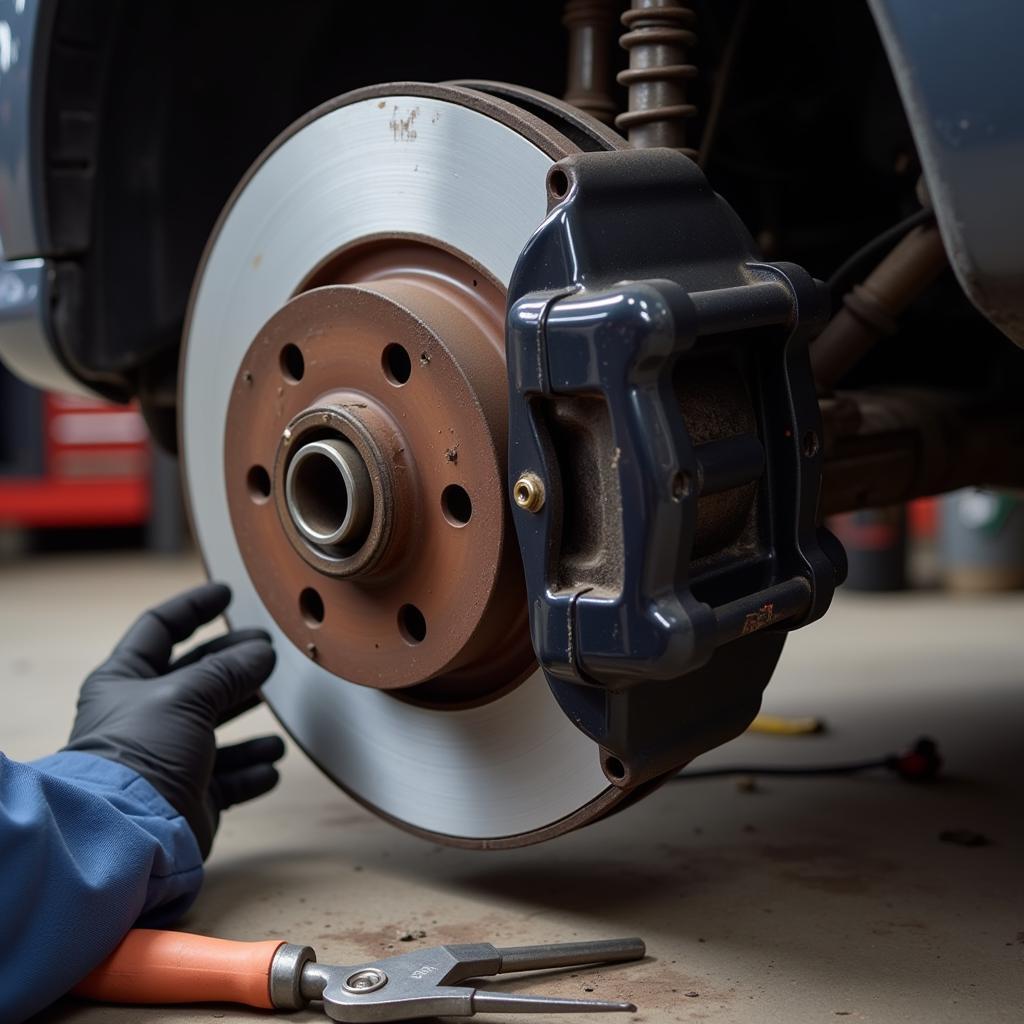Car Service Didn’t Pick Up Bearing Noise
My car was making a subtle humming noise, which I suspected was a wheel bearing. I took it to a car service center, but they couldn’t identify the issue. Frustratingly, the noise persisted, and I’m left wondering what to do next. This article explores why a car service might miss a bearing noise, the potential consequences, and what steps you can take if you’re in a similar situation.
Why a Car Service Might Miss Bearing Noise
There are several reasons why a car service might not diagnose a wheel bearing issue, even when it seems obvious to the car owner. Sometimes, the noise is intermittent or subtle, making it difficult to pinpoint during a routine inspection. Other times, the noise can be masked by other sounds, such as road noise or engine noise.
Environmental Factors Affecting Bearing Noise Detection
Environmental factors can play a significant role in whether a bearing noise is detectable. For example, a bearing might only make noise at certain speeds or under specific load conditions. If the mechanic doesn’t replicate these conditions during the inspection, they may miss the subtle signs. Road conditions can also influence the noise. Smooth pavement might mask the issue, while rough roads could amplify other noises, making the bearing harder to hear. Temperature also plays a role; a bearing might be quieter when cold and become louder as it warms up.
 Missed Bearing Noise Diagnosis
Missed Bearing Noise Diagnosis
Overlooking the Obvious: Human Error in Car Diagnostics
Even experienced mechanics can make mistakes. Sometimes, a mechanic might be focused on a more obvious issue and overlook the subtle signs of a failing bearing. Rushing through an inspection or simply having a bad day can also lead to misdiagnosis. Additionally, the complexity of modern cars, with their numerous electronic systems, can sometimes make it difficult to isolate the source of a specific noise.
The Importance of Clear Communication When Describing Car Issues
Clear communication between the car owner and the mechanic is crucial for accurate diagnosis. If you’re experiencing a bearing noise, try to describe it as precisely as possible. Note when the noise occurs (e.g., at certain speeds, during turns, when braking), the type of noise (humming, grinding, clicking), and its location (front or rear, left or right). This information can help the mechanic narrow down the possibilities and perform a more targeted inspection.
Consequences of a Misdiagnosed Bearing Noise
Ignoring a failing wheel bearing can lead to serious consequences. A completely seized bearing can cause the wheel to lock up while driving, leading to a loss of control and a potential accident. Even if the bearing doesn’t seize completely, continued driving with a damaged bearing can damage other components, such as the hub, axle, and even the brake system. This can result in costly repairs down the line.
Safety Concerns of Driving with a Faulty Bearing
Driving with a faulty bearing is a safety risk. A compromised wheel bearing can affect the vehicle’s handling and stability, making it more difficult to control, especially in emergency situations. This can increase the risk of an accident, especially at high speeds or on challenging road conditions.
What To Do If Your Car Service Missed the Bearing Noise
If you suspect a wheel bearing issue and the car service hasn’t identified it, don’t hesitate to seek a second opinion. Find another reputable mechanic or take your car to a specialist, such as a suspension and steering shop. Be sure to clearly communicate your concerns and provide all the relevant details about the noise. You can even record the noise with your phone and play it for the mechanic. This can be incredibly helpful in diagnosing intermittent noises.
Finding a Qualified Mechanic for Bearing Issues
Finding a qualified mechanic experienced in diagnosing and repairing bearing issues is critical. Ask for recommendations from friends, family, or online communities. Look for mechanics who specialize in suspension and steering systems or those with a proven track record of successfully diagnosing complex car problems. Don’t be afraid to ask questions about their experience and diagnostic procedures.
Conclusion
If your car service didn’t pick up bearing noise, it’s important to take action. Don’t ignore the problem. Seek a second opinion from a qualified mechanic, communicate your concerns clearly, and provide all the necessary details about the noise. Addressing the issue promptly can prevent further damage, ensure your safety, and save you money on costly repairs in the long run.
FAQ
-
How much does it cost to replace a wheel bearing? The cost varies depending on the car make and model, but typically ranges from $200 to $500 per wheel.
-
Can I drive with a bad wheel bearing? It’s not recommended. Driving with a bad bearing can be dangerous and lead to further damage.
-
What are the symptoms of a bad wheel bearing? Common symptoms include a humming or grinding noise, vibration in the steering wheel or floorboard, and uneven tire wear.
-
How long do wheel bearings last? Wheel bearings typically last between 85,000 and 100,000 miles.
-
Can a bad wheel bearing cause ABS light to come on? Yes, in some cases, a failing wheel bearing can affect the ABS system and trigger the warning light.
-
What tools are needed to replace a wheel bearing? Specialized tools are often required, such as a bearing press and hub puller.
-
Can I replace a wheel bearing myself? While possible, it’s generally recommended to have a qualified mechanic perform the repair due to its complexity.
Need More Help?
Check out these related articles on CarServiceOnline:
- Understanding Wheel Bearing Issues
- Choosing the Right Car Service Center
- Common Car Noises and Their Causes
Contact us via WhatsApp: +1(641)206-8880, Email: [email protected] or visit us at 456 Oak Avenue, Miami, FL 33101, USA. Our 24/7 customer support team is ready to assist you.
